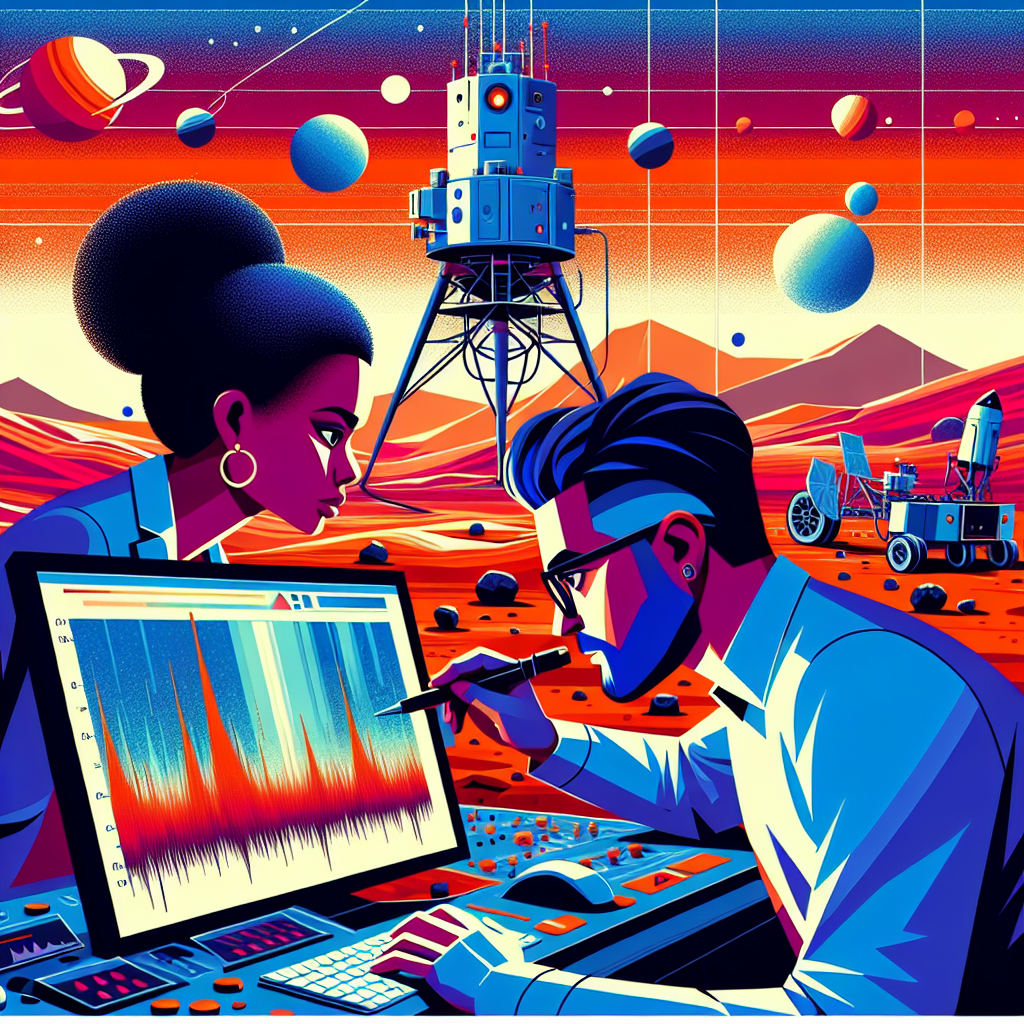John McFall used to be a Paralympian and now works with the European Space Agency (ESA). He lost part of his right leg in a motorcycle accident but is training to be an astronaut. John is helping to see if people with disabilities can live and work in space. He tries out different prosthetic limbs and uses special machines to feel what it’s like in space.
John is also a doctor but has paused his job to focus on astronaut training. He is training in Germany at the European Astronaut Centre. Even if he doesn’t go to space, his work will help make space travel safer for disabled people. John hopes this study will show what people with disabilities can do.
The ESA is the first to try a project like this. Frank De Winne, who leads the astronaut center, thinks people like John have special skills for space missions. John’s family moved to Germany to support him. His wife, Sonia, thinks this is the right path for him and hopes he can inspire others by going to space.
Original news source: The man on a mission to open up space to disability (BBC)
🎧 Listen:
Slow
Normal
Fast
📖 Vocabulary:
| 1 | Paralympian | An athlete who competes in sports events for people with physical disabilities |
| 2 | European Space Agency | An organization in Europe that explores space |
| 3 | prosthetic | An artificial body part, like a leg or arm |
| 4 | astronaut | A person who travels to space |
| 5 | training | Practicing to get better at something |
| 6 | disabilities | Physical or mental conditions that make it harder to do things |
| 7 | missions | Important tasks or jobs, often with a goal |
| 8 | inspire | To make someone want to do something good |
| 9 | project | A planned piece of work or activity |
| 10 | support | To help or encourage someone |
| 11 | accident | An unexpected event that causes harm or damage |
| 12 | study | Research or investigation to learn more about something |
Group or Classroom Activities
Warm-up Activities:
– News Summary
Instructions:
1. Divide the class into pairs or small groups.
2. Have each group read the article.
3. Instruct them to summarize the article in their own words, focusing on the main points.
4. After a given time, have each group share their summary with the class.
– Opinion Poll
Instructions:
1. Divide the class into pairs or small groups.
2. Assign each group a different question related to the article (e.g. “Do you think people with disabilities can live and work in space?”).
3. Instruct the groups to discuss the question and come up with their own opinions.
4. Have each group present their opinion to the class and explain their reasoning.
– Vocabulary Pictionary
Instructions:
1. Write a list of key vocabulary words from the article on the board.
2. Divide the class into pairs or small groups.
3. Assign each group a vocabulary word.
4. Instruct the groups to draw a picture that represents the word without using any letters or numbers.
5. Have the groups present their pictures to the class and see if the other students can guess the word.
– Pros and Cons
Instructions:
1. Divide the class into pairs or small groups.
2. Instruct each group to discuss the pros and cons of people with disabilities living and working in space, based on the information in the article.
3. Have each group present their arguments to the class, alternating between pros and cons.
4. Encourage class discussion and debate on the topic.
– Two Truths and a Lie
Instructions:
1. Have each student come up with two true statements and one false statement related to the article.
2. Instruct the students to share their statements with a partner or in small groups.
3. The partner/group must guess which statement is the lie.
4. After a given time, have students share their false statements with the class and see if the other students can guess the lie.
🤔 Comprehension Questions:
1. Who is John McFall and what does he do now?
2. How did John lose part of his right leg?
3. What is John training to be?
4. What does John do to see what it’s like in space?
5. What is John’s other job?
6. Where is John training to be an astronaut?
7. Why does John’s wife think going to space is the right path for him?
Go to answers ⇩
🎧✍️ Listen and Fill in the Gaps:
John McFall used to be a Paralympian and now works with the European Space (1)______ (ESA). He lost part of his right leg in a motorcycle accident but is training to be an astronaut. John is (2)______ to see if people with (3)______ can live and work in (4)______. He tries out different (5)______ limbs and uses special machines to feel what it’s like in space.
John is also a doctor but has paused his job to focus on astronaut (6)______. He is training in Germany at the European Astronaut Centre. Even if he doesn’t go to space, his (7)______ will help make space travel safer for (8)______ people. John (9)______ this study will show what people with disabilities can do.
The ESA is the first to try a project like this. Frank De Winne, who leads the (10)______ center, thinks people like John have special skills for space missions. John’s family moved to Germany to support him. His wife, Sonia, thinks this is the right (11)______ for him and hopes he can inspire (12)______ by going to space.
Go to answers ⇩
💬 Discussion Questions:
Students can ask a partner these questions, or discuss them as a group.
1. What is a Paralympian?
2. How would you feel if you lost part of your leg in a motorcycle accident?
3. Do you think it’s possible for people with disabilities to live and work in space? Why or why not?
4. What do you think it would be like to train to be an astronaut?
5. Do you like trying out new things, like different prosthetic limbs? Why or why not?
6. How do you think special machines can help someone feel what it’s like in space?
7. What would you do if you were training to be an astronaut?
8. What do you think it means to make space travel safer for disabled people?
9. Why do you think the European Space Agency is the first to try a project like this?
10. Do you have any special skills that you think would be useful for a space mission? What are they?
11. How do you think John’s family feels about him training to be an astronaut?
12. Do you think it’s important for people to inspire others? Why or why not?
Individual Activities
📖💭 Vocabulary Meanings:
Match each word to its meaning.
Words:
1. Paralympian
2. European Space Agency
3. prosthetic
4. astronaut
5. training
6. disabilities
7. missions
8. inspire
9. project
10. support
11. accident
12. study
Meanings:
(A) An artificial body part, like a leg or arm
(B) A planned piece of work or activity
(C) To make someone want to do something good
(D) An unexpected event that causes harm or damage
(E) A person who travels to space
(F) Practicing to get better at something
(G) Physical or mental conditions that make it harder to do things
(H) An organization in Europe that explores space
(I) Research or investigation to learn more about something
(J) Important tasks or jobs, often with a goal
(K) To help or encourage someone
(L) An athlete who competes in sports events for people with physical disabilities
Go to answers ⇩
🔡 Multiple Choice Questions:
1. What is John McFall’s current job?
(a) He is a doctor.
(b) He works with the European Space Agency (ESA).
(c) He is a Paralympian.
(d) He is a motorcyclist.
2. How did John McFall lose part of his right leg?
(a) In a motorcycle accident.
(b) In a space mission.
(c) In a doctor’s office.
(d) In a Paralympic event.
3. What is John McFall training to be?
(a) A doctor.
(b) A motorcyclist.
(c) A Paralympian.
(d) An astronaut.
4. What is John McFall doing to help make space travel safer for disabled people?
(a) He is training in Germany at the European Astronaut Centre.
(b) He is trying out different prosthetic limbs and using special machines to feel what it’s like in space.
(c) He is working with the European Space Agency (ESA).
(d) He is inspiring others by going to space.
5. Who is leading the astronaut center where John McFall is training?
(a) Sonia McFall.
(b) John McFall.
(c) Frank De Winne.
(d) The European Space Agency (ESA).
6. Why did John McFall’s family move to Germany?
(a) To work at the European Astronaut Centre.
(b) To live closer to the European Space Agency (ESA).
(c) To be closer to his doctor’s office.
(d) To support him in his astronaut training.
7. What does John McFall’s wife, Sonia, hope he can do by going to space?
(a) Become an astronaut.
(b) Work with the European Space Agency (ESA).
(c) Inspire others.
(d) Move to Germany.
8. Who is the first to try a project like the one John McFall is involved in?
(a) The European Space Agency (ESA).
(b) Frank De Winne.
(c) John McFall.
(d) Sonia McFall.
Go to answers ⇩
🕵️ True or False Questions:
1. John is training in Germany at the European Astronaut Centre.
2. John is also a doctor but has paused his job to focus on astronaut training.
3. John lost part of his left leg in a motorcycle accident but is training to be a cosmonaut.
4. The ASA is the last to try a project like this, and they believe people without disabilities have special skills for space missions.
5. Even if John goes to space, his work will not help make space travel safer for disabled people.
6. John is helping to see if people with disabilities can live and work in space.
7. John McFall used to be a Paralympian and now works with the American Space Agency (ASA).
8. John tries out different prosthetic limbs and uses special machines to feel what it’s like in space.
Go to answers ⇩
📝 Write a Summary:
Write a summary of this news article in two sentences.
Check your writing now with the best free AI for English writing!
Writing Questions:
Answer the following questions. Write as much as you can for each answer.
Check your answers with our free English writing assistant!
1. What happened to John McFall that caused him to lose part of his right leg?
2. What is John training to be?
3. What is John doing to help see if people with disabilities can live and work in space?
4. What is the European Space Agency (ESA)?
5. Why did John’s family move to Germany?
✅ Answers
🤔✅ Comprehension Question Answers:
1. Who is John McFall and what does he do now?
John McFall used to be a Paralympian and now he works with the European Space Agency (ESA).
2. How did John lose part of his right leg?
John lost part of his right leg in a motorcycle accident.
3. What is John training to be?
John is training to be an astronaut.
4. What does John do to see what it’s like in space?
John tries out different prosthetic limbs and uses special machines to feel what it’s like in space.
5. What is John’s other job?
John is also a doctor.
6. Where is John training to be an astronaut?
John is training in Germany at the European Astronaut Centre.
7. Why does John’s wife think going to space is the right path for him?
John’s wife thinks going to space is the right path for him because she hopes he can inspire others by going to space.
Go back to questions ⇧
🎧✍️✅ Listen and Fill in the Gaps Answers:
(1) Agency
(2) helping
(3) disabilities
(4) space
(5) prosthetic
(6) training
(7) work
(8) disabled
(9) hopes
(10) astronaut
(11) path
(12) others
Go back to questions ⇧
📖💭✅ Vocabulary Meanings Answers:
1. Paralympian
Answer: (L) An athlete who competes in sports events for people with physical disabilities
2. European Space Agency
Answer: (H) An organization in Europe that explores space
3. prosthetic
Answer: (A) An artificial body part, like a leg or arm
4. astronaut
Answer: (E) A person who travels to space
5. training
Answer: (F) Practicing to get better at something
6. disabilities
Answer: (G) Physical or mental conditions that make it harder to do things
7. missions
Answer: (J) Important tasks or jobs, often with a goal
8. inspire
Answer: (C) To make someone want to do something good
9. project
Answer: (B) A planned piece of work or activity
10. support
Answer: (K) To help or encourage someone
11. accident
Answer: (D) An unexpected event that causes harm or damage
12. study
Answer: (I) Research or investigation to learn more about something
Go back to questions ⇧
🔡✅ Multiple Choice Answers:
1. What is John McFall’s current job?
Answer: (b) He works with the European Space Agency (ESA).
2. How did John McFall lose part of his right leg?
Answer: (a) In a motorcycle accident.
3. What is John McFall training to be?
Answer: (d) An astronaut.
4. What is John McFall doing to help make space travel safer for disabled people?
Answer: (b) He is trying out different prosthetic limbs and using special machines to feel what it’s like in space.
5. Who is leading the astronaut center where John McFall is training?
Answer: (c) Frank De Winne.
6. Why did John McFall’s family move to Germany?
Answer: (d) To support him in his astronaut training.
7. What does John McFall’s wife, Sonia, hope he can do by going to space?
Answer: (c) Inspire others.
8. Who is the first to try a project like the one John McFall is involved in?
Answer: (a) The European Space Agency (ESA).
Go back to questions ⇧
🕵️✅ True or False Answers:
1. John is training in Germany at the European Astronaut Centre. (Answer: True)
2. John is also a doctor but has paused his job to focus on astronaut training. (Answer: True)
3. John lost part of his left leg in a motorcycle accident but is training to be a cosmonaut. (Answer: False)
4. The ASA is the last to try a project like this, and they believe people without disabilities have special skills for space missions. (Answer: False)
5. Even if John goes to space, his work will not help make space travel safer for disabled people. (Answer: False)
6. John is helping to see if people with disabilities can live and work in space. (Answer: True)
7. John McFall used to be a Paralympian and now works with the American Space Agency (ASA). (Answer: False)
8. John tries out different prosthetic limbs and uses special machines to feel what it’s like in space. (Answer: True)
Go back to questions ⇧















